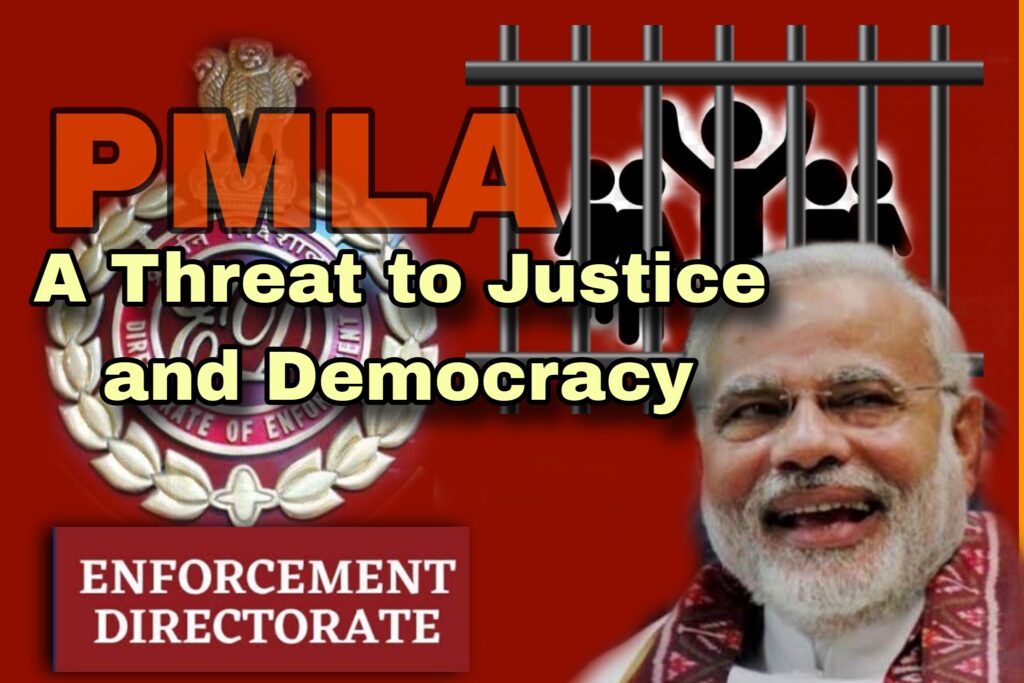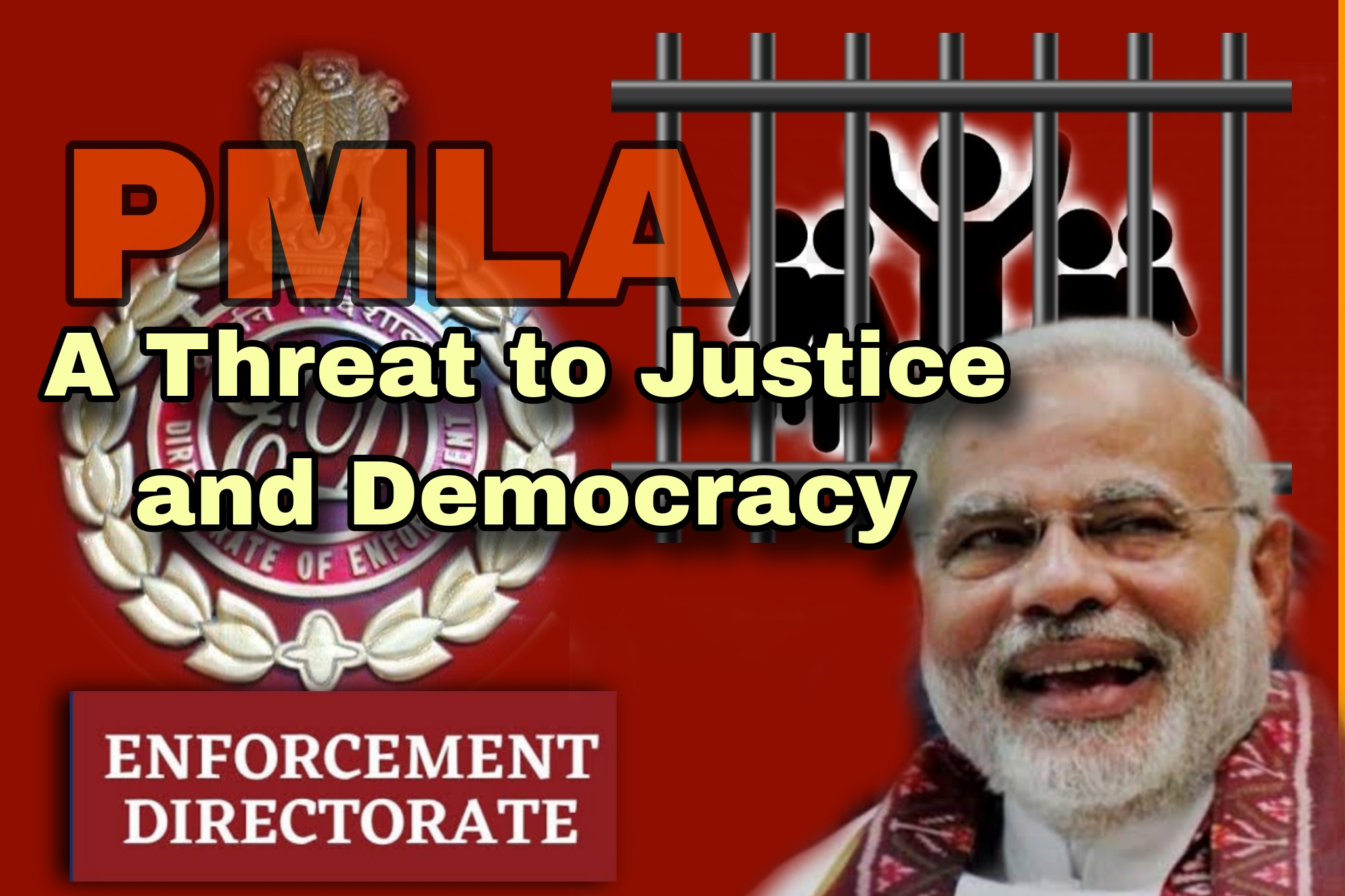
A Threat to Justice and Democracy
The mere mention of the Prevention of Money Laundering Act (PMLA) conjures images of high-profile arrests, with names like Arvind Kejriwal, Manish Sisodia, and Hemant Soren often dominating headlines. However, what is often overlooked is that these political figures represent a mere 3% of all cases under the PMLA. Of these, nearly 90% are leaders from opposition parties, raising serious questions about the selective application of this law.
The Prevention of Money Laundering Act (PMLA), enacted in 2002, was designed to combat money laundering and confiscate property derived from criminal activities. However, over the years, its application has raised significant concerns about its potential misuse, particularly in the realm of politics. The disproportionate targeting of opposition leaders and the stringent provisions that make it exceedingly difficult for the accused to secure bail have led to widespread criticism.
PMLA: A Weapon for Political Vendetta?
The PMLA was introduced with the noble intention of curbing money laundering and preventing criminal proceeds from infiltrating the legitimate economy. However, the staggering increase in cases—over 250%—since the BJP came to power in 2014, and the fact that convictions have been secured in only 24 out of thousands of cases, reveals a disturbing pattern. Many legal experts argue that the law has morphed into a political weapon, used to silence and suppress opposition voices. The misuse of PMLA has led to an atmosphere where the mere accusation under this law is enough to strip individuals of their liberty for months, if not years, without the crime being proven.
A Law Designed to Confound
Legal experts have long argued that the PMLA contains provisions that severely undermine the rights guaranteed by the Indian Constitution. For instance, under this law, the Enforcement Directorate (ED) is endowed with extensive powers to detain individuals on mere suspicion that they are involved in money laundering activities. This power extends to anyone who comes into contact with the proceeds of crime, regardless of whether they are aware of the criminal origin of the money. The ED can arrest a person without providing them with clear evidence or even a copy of the Enforcement Case Information Report (ECIR), which is akin to an FIR. The accused, therefore, remains in the dark about the charges against them, making it nearly impossible to mount an effective defense.
One of the most draconian aspects of the PMLA is Section 45, which makes it extremely difficult for the accused to obtain bail. The law stipulates that bail can only be granted if the court is convinced that the accused is not guilty of the alleged offense and that they are unlikely to commit any offense if released. This reverses the fundamental principle of criminal justice that a person is innocent until proven guilty, effectively making incarceration the rule rather than the exception.
The Judiciary’s Stance
The PMLA has been in force for over two decades, and its implementation has seen a dramatic increase under the current regime. Between 2005 and 2014, the ED registered 1,797 cases under the PMLA. However, from 2014 to 2023, during the BJP’s tenure, this number surged to 5,155 cases—a nearly 250% increase. Despite this rise in cases, convictions have been exceedingly rare, with only 24 out of thousands of cases resulting in a conviction over the law’s 21-year history.
This troubling trend led to a slew of petitions challenging the constitutionality of the PMLA, particularly its harsh provisions like Section 45. In 2022, a three-judge bench of the Supreme Court upheld the law, arguing that its stringent measures were justified given the serious nature of money laundering offenses. However, this decision was not without controversy, especially given that it was delivered just two days before the retirement of Justice Khanwilkar, who authored the judgment.
Also Read :— The Erosion of Credibility—Supreme Court’s Scathing Critique of the Enforcement Directorate
In recent months, the Supreme Court has made several critical observations regarding the PMLA, particularly in cases where the accused have been held without trial for extended periods. In granting bail to Delhi’s Deputy Chief Minister Manish Sisodia, who had been jailed for 17 months, the court emphasized that “speedy trial is a fundamental right under Article 21 of the Constitution.” The court criticized the lower courts for their reluctance to grant bail, reiterating that “bail is the rule, refusing bail is the exception.”
Similarly, in the case of Prem Prakash, an associate of Jharkhand Chief Minister Hemant Soren, the Supreme Court underscored that the provisions of Section 45 must be interpreted in light of Article 21, which guarantees the right to life and personal liberty. The court clarified that Section 45 should not be construed to mean that denial of bail is the norm. Instead, bail should be granted unless there are compelling reasons to deny it.
A Call for Reform
As the PMLA faces increasing scrutiny, particularly in the context of its application against political opponents, it is clear that the law requires a more balanced approach. While the fight against money laundering is undeniably important, it must not come at the cost of fundamental rights and the principles of justice. The upcoming review petition against the Supreme Court’s 2022 judgment offers an opportunity to re-evaluate the law’s constitutionality, its implementation, and its impact on the rule of law in India.
The Prevention of Money Laundering Act, in its current form, is a law that demands urgent reform. The Supreme Court’s recent comments should serve as a wake-up call for the legislature to revisit this law and align it with the constitutional principles of justice, liberty, and fairness. While the fight against money laundering is critical, it cannot come at the cost of eroding the very rights and freedoms that define a democratic society.
Reforming the PMLA: Striking a Balance
To restore the public’s faith in the legal system and ensure that the PMLA serves its intended purpose without overstepping constitutional boundaries, several key reforms could be considered.
- Judicial Oversight on Arrests:— There should be a mandatory judicial review before any arrest is made under the PMLA. This would ensure that the Enforcement Directorate (ED) cannot detain individuals based solely on suspicion without strong prima facie evidence. Introducing a layer of judicial scrutiny would prevent arbitrary arrests and reduce the misuse of the law as a tool for political vendetta.
- Transparency and Accountability:— The ED should be required to provide a detailed explanation and evidence for the arrest and detention of individuals under the PMLA. This transparency would align the law with the fundamental right to a fair trial and due process, allowing the accused to understand and challenge the charges against them effectively.
- Bail Reform:— The harsh bail provisions under Section 45 of the PMLA need reconsideration. The principle that bail should be the norm, and jail the exception, must be reinstated. Courts should ensure that bail is granted unless there is compelling evidence to suggest that the accused poses a significant risk to society or to the investigation.
- Time-Bound Trials:— To prevent prolonged pre-trial detentions, there should be strict timelines for the conclusion of trials under the PMLA. This would ensure that individuals are not unjustly kept in jail for years without a conviction, thereby protecting their fundamental rights.
- Differentiation of Cases:— The PMLA should incorporate a clear distinction between cases of severe financial crimes involving large sums of money and those involving minor or unintentional infractions. This differentiation would help focus resources on genuine cases of money laundering while preventing the overreach of the law into less serious matters.
Political Will and Legal Safeguards
For these reforms to be effective, there needs to be a political will to address the misuse of the PMLA. The government must recognize that a just and fair application of the law is crucial for maintaining the legitimacy of the state and the trust of its citizens. The judiciary also plays a critical role in safeguarding constitutional rights, and it must continue to scrutinize the PMLA’s provisions and their application critically.
Upholding Justice in the Fight Against Money Laundering
The Prevention of Money Laundering Act is a powerful tool in India’s legal arsenal, designed to combat financial crimes that can undermine the nation’s economy and security. However, its power must be wielded with caution and respect for the rights of individuals. As the law stands today, it poses significant challenges to the principles of justice and fairness that are the bedrock of India’s democracy.
The upcoming review petition presents a crucial moment for reflection and potential reform. By striking a balance between enforcing the law and protecting individual rights, India can ensure that the PMLA serves its intended purpose without compromising the fundamental freedoms that define the nation. It is only through such a balanced approach that the PMLA can become a true instrument of justice rather than a tool of oppression.

